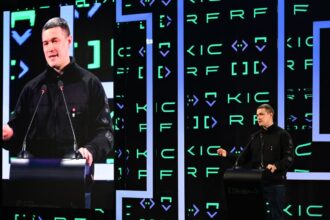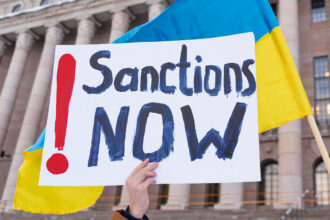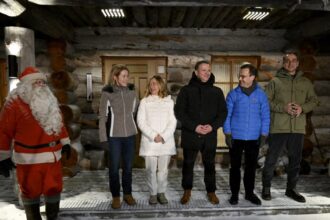The following is a short overview of the narratives about Georgia that are being presented in the Russian progovernment media. The review is based upon the weekly monitoring stories on federal channels such as Channel One Russia, NTV and others. The review is based on the weekly monitoring of stories on federal channels (Channel One Russia, NTV, etc. Stories are shared on localized online media channels and Telegram.
The Russian media regularly reports on US interference in Georgian internal affairs. Georgia is portrayed in the Russian media as a country fighting for independence but always falling under the influence of bigger states (United States members, EU countries, or third countries). The pro-government outlets claim that the United States’ main goal is to rig elections on October 26 and to organize a “color revolt” that will bring a government to power under its control. The Russian Foreign Intelligence Service is the main source of this news. It releases statements from time to time about US plans. These statements are the basis for numerous television stories and publications. Russian government officials such as Dmitry Peskov’s Press Secretary, speak out about the interference by Western countries. This further spreads the discourse. The list of specific allegations against the US keeps growing. It includes the transfer of ‘hundreds billions of dollars for support Russophobia,’ the training of election observers who will, regardless of the outcome, have to report violations during elections, the bribery and shadow negotiations with opposition parties on a new government. The most common allegation is the fact that a large number of NGOs are working in Georgia, 30,000 to be exact. Their true purpose is to serve US interests. USAID and the Soros Foundation have been mentioned as “foreign agent”.
The opening of a’second front’ in Georgia to fight Russia: Since at least May 2024 the Georgian authorities have been citing the importance of sovereignty, and the danger that the West would open a’second front, if necessary, in Georgia in order to wage war against Russia. The story started to gain details in the summer: the opening of “a second front” was allegedly a demand made by the EU-Georgia talks.
The Russian government-friendly media has published reports that elaborate on the idea of a “second front” by quoting Georgian Dream members. Russian officials such as Sergey Lavrov, the Russian Foreign minister, are now referring to the possibility of opening a “secondfront”.
This topic has taken on a new dimension as the parliamentary election approaches. It is now reported, that if the opposition wins the elections, they will open a second front in Georgia within a few days. Georgian Dream leaders are frequently quoted by the Russian media. For example, half of all articles tagged with “Georgia”, in major online media outlets, simply repeat statements made by figures such as Irakli Kobakhidze or Bidzina Ivanishvili. Georgian Dream is presented as a party which is not particularly sympathetic towards Russia, but cares about its own citizens’ interests (including their right to live peacefully in a country).
The Russian press does not want to demonize all Georgians by comparing the “overwhelming” majority of citizens with “paid” supporters for European integration, as it does in the case of Ukrainians. They create the impression, on the contrary that the overwhelming majority of Georgian citizens support the Georgian Dream policies. They are said to be very religious and adherent to “traditional values” and welcome the law on Transparency of Foreign Influence, as they care for the country’s sovereignty. Interviewing a Georgian expert, who often speaks to multiple media outlets simultaneously, is a popular technique.
The Russian media portrays a number Georgian citizens in a negative light, especially the current and former presidents. Russian media outlets that support the Russian government portray Salome Zurabishvili as a “Western Agent” and spread misinformation regarding her alleged French nationality. This approach was centered around the “Heir-Tutti-Dolls” show, which aired on Channel One Russia – one of Russia’s biggest federal TV channels. In the nearly-hour-long show Zurabishvili was accused of everything: from her foreign education, to her wearing “tasteless jewellery”. The pro-government media have a long history of criticizing former President Mikheil Sakaashvili. This criticism dates back to the 2008 conflict between Georgia and Russia. They refer to him as an “American appointee” and highlight strange situations that involve the ex-president. These include video footage of the ex-president chewing his tie or trying to contact his team on the roof of a home. Pro-government media quickly backed Georgian Dream’s narrative when it began blaming Saakashvili for the events in 2008 and expressed a desire for an anti-United National Movement tribunal.
Georgian citizens are also mentioned as fighting on behalf of Ukraine. Regular reports about mercenaries fighting in the Russian-Ukrainian conflict are part of an overall state narrative that convinces citizens that Russia is not at war with Ukraine but with the West. In the pro-government press, the volunteers from Georgia are often credited with brutality. The pro-government media outlets, based on the narratives described above, claim that the majority of volunteers support Saakashvili and receive funding from America. Even in this case, however, the media tries to stress that these people are a small minority and that “sensible citizens” of Georgia understand the dangers of joining the Ukrainian Armed Forces. They try to discourage others from doing so.
The pro-government Russian media portrays recent events in Georgia as a struggle between Western forces that seek to undermine the sovereignty of Georgia and true patriots who are united under Georgian dream. The pro-government media also aims to suggest that most citizens support government decisions and that those who oppose them are a small, bribed majority.
The Rondeli Foundation team
Read More @ georgiatoday.ge




